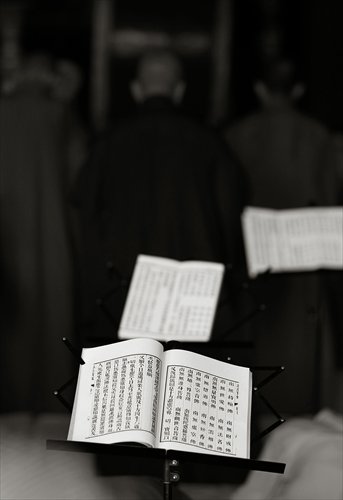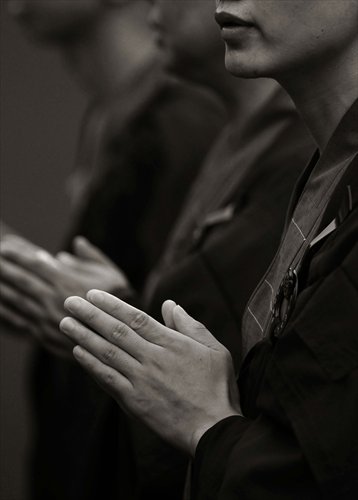Finding the peace within

An increasing number of office workers and non-Buddhists in the city are taking up Buddhist meditation practices. Photos: CFP
Get up at 5 am, drink a cup of lukewarm water, have a few walnuts, and sit still for a whole hour. That's how Chen Gaofei starts his day every morning. When his mobile phone alarm rings mildly, he stands up slowly, rubs his eyes and ears gently and gets prepared to set off for work.
Chen is a practitioner of mindful breathing, a method of Buddhist meditation. But the bald man is not a secular Buddhist devotee; he works at a logistics company in Pudong New Area. The main goal of the practice is to allow feelings and thoughts to come and go without getting caught up in them. "When I first started, it was easy for me to get lost in the thoughts that would arise in my head. But now I simply bring my attention back to my breathing."
The 33-year-old is not alone in such Buddhist meditation. It's becoming a trend among office workers in the city to take up similar practices for a variety of reasons, such as reducing stress and clearing up their minds. While Chen does it at home, many gather in special venues for the sessions. Some even bring along a few simple items of luggage and retreat to temples in suburban Shanghai and neighboring provinces.

An increasing number of office workers and non-Buddhists in the city are taking up Buddhist meditation practices. Photos: CFP
Widening appeal
Buddhists have traditionally pursued meditation as part of their journey towards enlightenment and nirvana. The practice is, however, gaining increasing popularity among non-Buddhists in the city.
"It helps to pacify my inner world, and makes me more consistent in how I react to exterior influences, as mindful breathing has helped strengthen my insight into reality," Chen said. He was taken to a meditation session by a friend two years ago after complaining of insomnia brought on by work stress.
"No knowledge of Buddhism is required for attendees. Most people there were seeking a solution," Chen said.
However, the sessions were suspended when the organizer, Soul's Home - which did not charge attendees, but accepted donations - could not raise enough funds to pay the rent.
In Buddhist philosophy, meditation is believed to enable people to stay conscious upon their death and have a better control of their afterlife. But many office workers who practice it simply hope it will free them from the anxiety brought about by their busy lives, or help them better figure a way out of a dilemma.
Another former attendee of the Soul's Home sessions, surnamed Lao, said she practices mindful walking for 30 minutes every day along the avenue outside Century Park. Lao is an HR officer with a multinational firm in Shanghai. It takes her nearly two hours to get to and from work. "I often stay in my head thinking of the problems I need to fix or the things I've already gone through in the office, and it exhausts me," she told the Global Times.
During the 30-minute walk every night, Lao said she forces herself to look around and pay attention to what she can see and hear. "The more I do the walk, the more different sensations I can feel from outside and within."

An increasing number of office workers and non-Buddhists in the city are taking up Buddhist meditation practices. Photos: CFP
Communal experience
Given a growing pursuit of Buddhist meditation, Li Ronghao and his friends co-founded Orange's Home last year. Registered as a private non-enterprise unit, the home in a 200-square-meter apartment on Huamu Road, Pudong, is open to people every day except Mondays.
"Nearly 100 people regularly attend our sessions. They are mostly office workers in their 20s and 30s," Li told the Global Times, adding that there are also a few college students.
The two teachers there are secular Buddhist devotees. "But they explain the classics or communicate with the attendees in a very plain and simple way," Li said. And they teach more than the traditional meditation methods like mindful breathing and facing the wall for a whole day without speaking a word. Traditional Chinese pursuits like tea making, calligraphy and playing the guqin (a seven-stringed musical instrument) have also been added to the class schedule.
"Take the 'mind and tea' class, for example. Tea is only the method. While we do teach people how to make tea, the emphasis is still on how to enable people to concentrate on their mind and understand themselves."
Li said the co-founders of Orange's Home are always ready and happy to help. They fund the operation of the facility, although occasionally attendees also make donations. "The main expenditure is the rental fee. Fortunately, we've managed to make ends meet."
Orange's Home also arranges for its attendees to go to nearby rural farms to take part in silent day events, in which people are not allowed to talk, and try to concentrate on sensing the surroundings and what's within themselves.
While many embrace the big family-style meditation, some simply head for a temple for soul cultivation on weekends.
Marriage counselor Zhao Caixia described her meditation experience during a stay at a temple in her blog. This included a vegetarian diet, listening to the chanting of sutras, interacting with Buddhist devotees and walking in the natural surroundings. She described it as a trip about finding herself.
Shifo Temple and Xianghai Temple in Jiaxing, Zhejiang Province are among the most popular choices for the city's office workers. Mount Putuo in Zhejiang, home to a few prestigious temples, is an even bigger attraction. Ctrip.com offers a two-day self-driving meditation trip to the mountain for 350 yuan ($56.07).